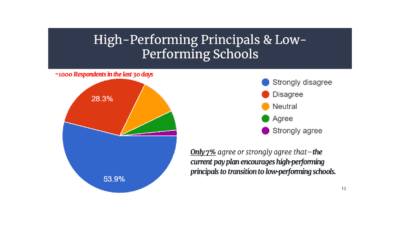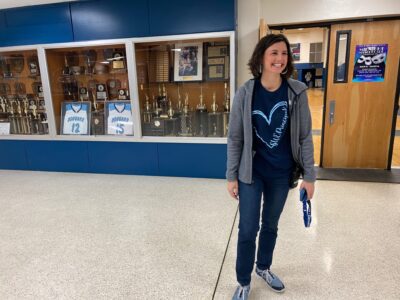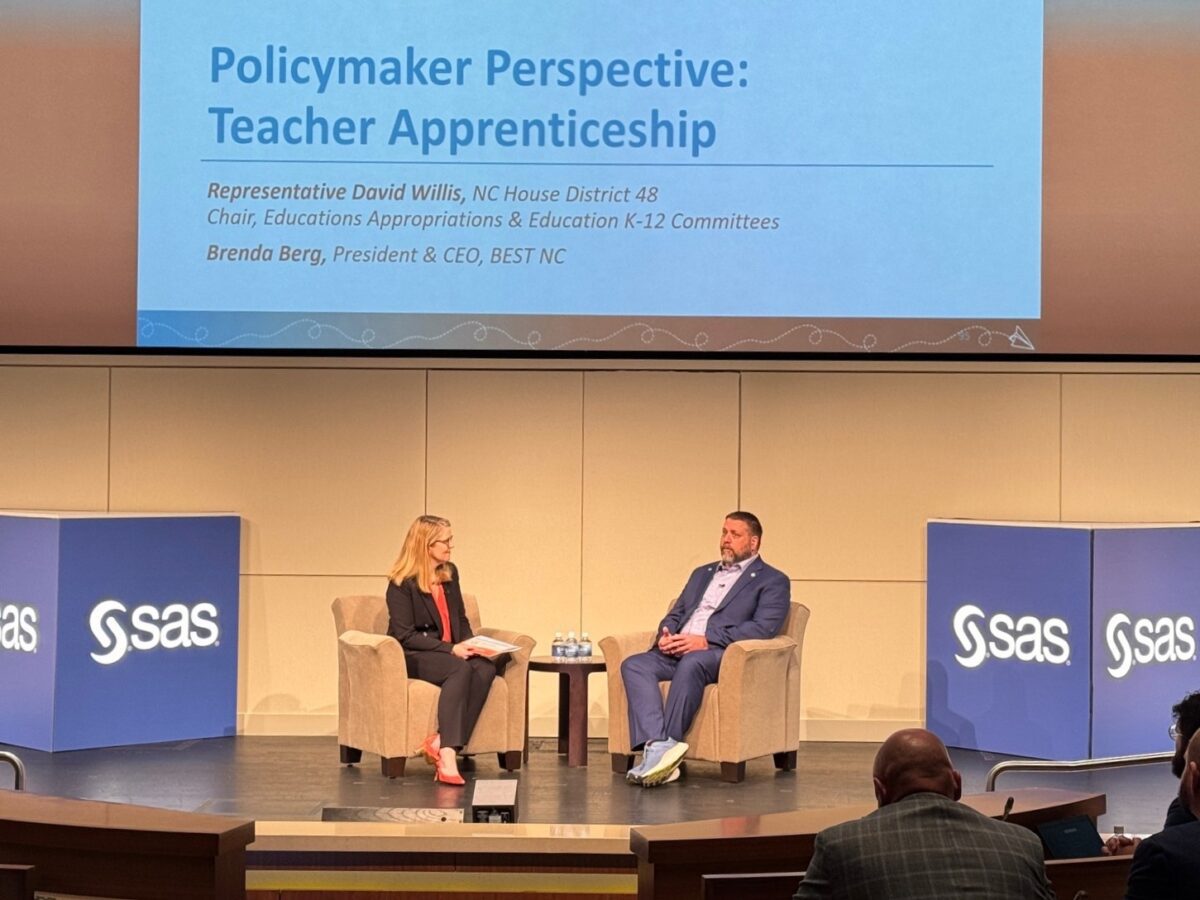
BEST NC celebrates 10 years: ‘A decade of innovation. A lifetime of impact.‘
Two hundred education stakeholders, policymakers, and business leaders gathered for BEST NC’s 10th Annual North Carolina Education Innovation Lab to celebrate “a landmark moment in the future of our state’s education landscape,” according to the agenda.
Walter McDowell, the founding chair of BEST NC, says the organization has focused for ten years on the two roles that have the most impact on students: teachers and principals.
BEST NC’s Educator Innovation Plan — a vision that emerged from the labs — includes support for Advanced Teaching Roles (ATR), the New NC Principal Fellows Program, TeachNC, teacher pay, principal pay, and now teacher apprenticeships.
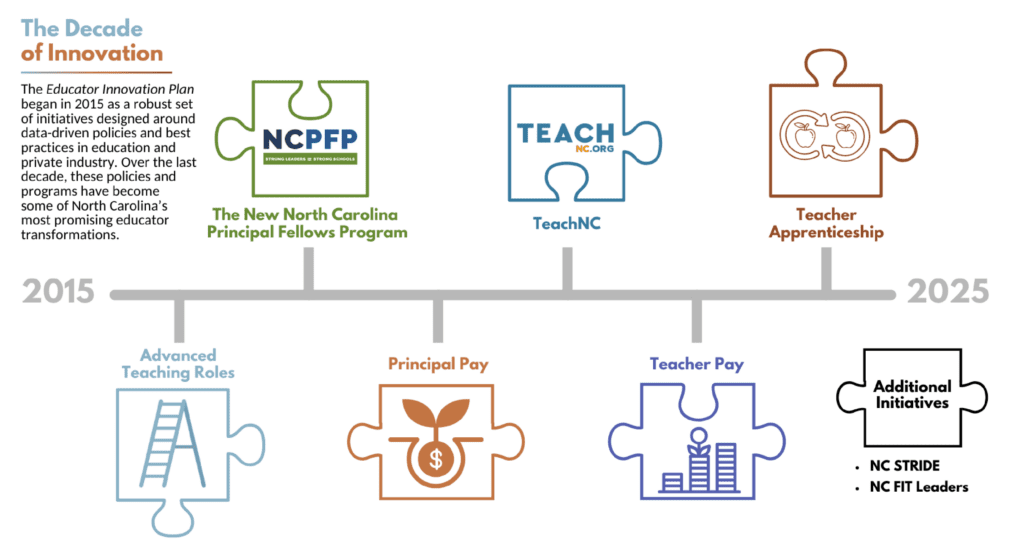
The plan has led to 600+ principals prepared by the NC Principal Fellows Program, 9,000+ teaching candidates recruited through TeachNC, 2,700+ teachers in ATR, 400+ schools reimaging their organizational structure through ATR, and 225,000+ students with increased access to effective educators thanks to ATR.
Ten years in, every school in North Carolina has access to at least two of the six innovations in the plan: TeachNC and principal pay.
Making North Carolina first in education — first in teaching, first for students — is the goal of the organization, the lab, and the plan.
“To be honest,” said Brenda Berg, the founding president and CEO of BEST NC, “inside the state, these are some of our best kept secrets.”
“Outside North Carolina,” she said, “we’re leading the nation.”
The why behind the plan: ‘It’s not ok to be an average state in a below average country’
“Let’s talk about the students,” said Berg at the start of the lab.
“It’s not ok to be an average state in a below average country,” she said after reviewing recent data comparing North Carolina to the nation and then data for the nation compared to the rest of the world.
Berg noted that 41% of teachers in North Carolina now start their career without formal training or classroom experience — and that number has doubled in the last eight years.
This “growing crisis,” she said, means “we are exposing students to under-prepared teachers, and those teachers are under-supported.”
Those teachers leave the profession and those students struggle at higher rates, Berg said.
“The best schools in North Carolina do one thing,” she said. “They invest in good people. Full stop.”
Advanced Teaching Roles in North Carolina
“ATR models create opportunities for additional compensation and meaningful leadership roles for effective teachers while providing embedded professional support for novice teachers,” according to this BEST NC brief.
Dr. Tom Tomberlin, senior director of the office of educator preparation and licensure in the N.C. Department of Public Instruction, said there are three pillars in any good compensation system: 1) compensation that is professional in nature and attracts professionals to the job, 2) a compensation system that provides career development and advancement opportunities, and 3) a compensation system that rewards educators who positively impact student outcomes.
“Students are our clients in this enterprise,” said Tomberlin.
ATRs move schools from the outdated organizational model shown below to an organizational model that looks more like businesses with lead teachers supervising teams of teachers.
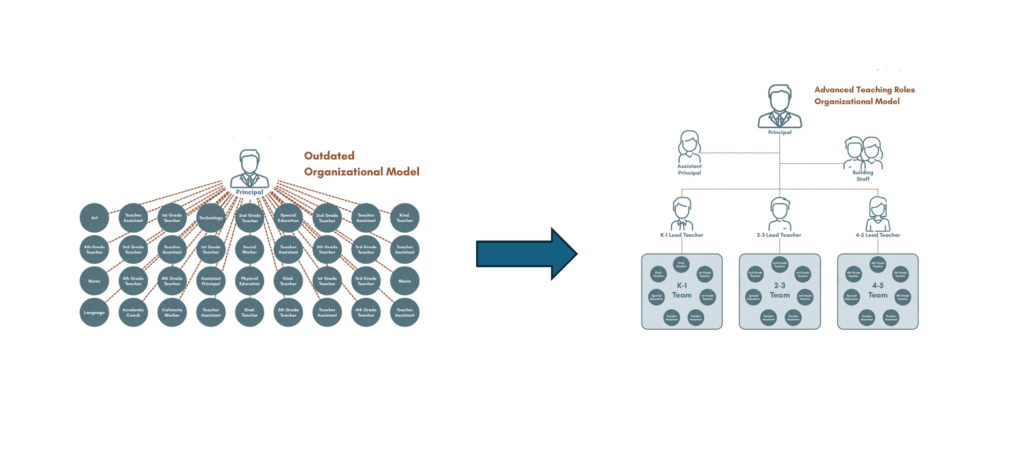
“A third of our districts are doing ATR. We can be statewide in ten years,” said Berg.
The New North Carolina Principal Fellows Program

The New North Carolina Principal Fellows Program is administered by the North Carolina Principal Fellows Commission in collaboration with the North Carolina State Education Assistance Authority (SEAA). The program currently resides at the UNC System office. You can learn more about the history of the program in this BEST NC brief.
Lauren Lampron, a former principal in Edgecombe County, is the director of the program.
She shared her experience of the program, which helped her feel like the state was saying, “I see you, I believe in you, I am going to invest in you.” She said the strength of the program is that homegrown educators are able to start their tenure as principal “ready to lead.”
Currently, the program produces 40% of principals needed each year, and the goal is to train 70% of principals by 2032.
TeachNC: The one-stop-shop for becoming a teacher
“TeachNC’s mission is to inspire the next generation of amazing educators — starting with you,” says the TeachNC website.
TEACH is a 501(c)(3) nonprofit organization, founded by the U.S. Department of Education.
TeachNC was created through a public-private partnership between NC DPI, TEACH.org, and BEST NC in collaboration with North Carolina’s public schools, districts, and educator preparation programs.
TeachNC website
Year over year for five years, Gabrielle Barnes, the director of regional initiatives and program at TeachNC, said Teach NC has supported more and more future teachers into the pipeline from 529 to 1,436 to 1,722 to 2,298 to 3,748 — more than 9,700 educators overall.
That’s a 708% increase, according to Barnes’ presentation.
When those interested in being educators sign up for TeachNC, they are able to access teacher certification guides, a teacher prep program database, and information about financial aid, salary, and benefits in addition to other supports.
Principal pay: A professional approach
According to BEST NC, the previous statewide principal pay schedule was based on each principals’ years of experience, level of education, and the number of teachers in the school they led.
Now an innovative pay model allows principal pay to be based on the size of the school plus two stackable bonuses based on school-level growth scores and school performance grades.
BEST NC, which says principals are the superheroes of public schools, says while the new pay model is helping reward our most effective principals for their impact on students, additional improvements are necessary. One of those improvements is to pay principals more for leading more complex schools, according to the organization.
Complexity pay compensates principals in schools that are harder to lead, taking into account student demographics, for example.
“The goal is to put the best principals in front of students,” said Kelly Ann Mudd, the principal of Martin Millennium Academy in Edgecombe County Public Schools.
Teacher pay: A smart investment in student achievement
BEST NC recently released the 2025 edition of “Teacher Pay in North Carolina: A Smart Investment in Student Achievement.”
Between 2013-14 and 2018-19, “as a result of investments totaling over $1 billion,” says the report, “North Carolina rose from 47th in average teacher pay in 2013-14 to 30th in 2018-19.”
Berg said, “We can do that again.”
“What teachers love is to impact students,” said Leah Carper, the director of stakeholder engagement for Guilford County Schools and the 2022 Burroughs Wellcome Fund North Carolina Teacher of the Year. “It’s about money, but it’s also about opportunity.”
The opportunity to change the lives of students and the opportunity to lead in that process, she said.
The compensation model, says BEST NC, should raise the floor of starting pay, raise the ceiling for effective educators, attract and retain hard-to-staff positions, and reframe the compensation context.
The next innovation: Teacher apprenticeship
A new brief from BEST NC makes the case for teacher apprenticeships, which would provide in-classroom preparation for the next generation of teachers.
North Carolina has an opportunity to develop a strong statewide teacher apprenticeship program that creates a new and innovative pathway into the profession, helps schools fill critical vacancies and retain more of their effective teachers, and better prepares teachers to drive student achievement gains from the moment they enter the classroom.
BEST NC brief
Tennessee was the first state in the nation to establish a federally-registered teacher apprenticeship in 2018, according to the brief, and now school districts in 47 states have established programs.
David Donaldson, the founder and managing partner for the National Center for Grow Your Own, said “it’s a myth that no one wants to be a teacher.”
What states need, he says, is “a clear, articulated pathway for an aspiring educator to become a teacher for free and get paid to do so.”
The brief says, “North Carolina could recruit and support around 5,700 teacher apprentices with roughly two apprentices in each of the state’s approximately 2,700 public schools.”
“North Carolina is a great place to do business,” said John Loyack, the vice president of economic development with the N.C. Community College System. “What those businesses ask for right away is they want a qualified workforce, they want to know where we are going to house that workforce, and then they want to know if we have the healthcare and education for their families.”
“This is a must-do,” he said.
Dr. Felicia Brown, director of human resources for Wayne County Public Schools, encouraged school districts to take a leap of faith. “Don’t let anything stop you from doing this,” she said.
A legislative champion for teacher apprenticeships: Meet Rep. David Willis
“It’s time for us to be first in education,” said Rep. David Willis, R-Union, who owns and operates an early child care center.
Willis grew up in North Carolina. He attended public schools, and his kids attend public schools.
In his remarks at the lab, he talked about an array of needs that need to be addressed for North Carolina to be first in education from capital needs to teacher pay to recruitment and retention.
But he also talked about his plans to continue to champion teacher apprenticeships.
Willis told the story of a community in his district where even the Wal-Mart closed.
“How do we help communities across the state,” he asked.
He believes in a grow your own model that leverages the community college system and online learning.
His office is working with a cohort of 6-7 districts, he said, and the goal is for students interested in becoming teachers to be identified in high school, enrolled in career and college promise to earn college credit while in high school, hired by the school district as a teacher assistant to earn money, and get to work with a mentor to learn how to teach.
The students will complete their associates degree and then transfer to an educator preparation program (EPP) to earn their bachelors degree online with a loan that is forgivable if they agree to teach back home for a certain number of years.
These students, he said, would work in our classrooms from day one and continue to work in the classrooms earning money as they earn the degrees needed to become a teacher.
“We should be able to all thrive, all provide the best quality education regardless of what community, what part of the state you live in from Murphy to Manteo,” said Willis.
Here is the landing page for the lab to see all of the speakers. Check out #NCEdLabX #DecadeOfInnovation on social to see more from the lab.


